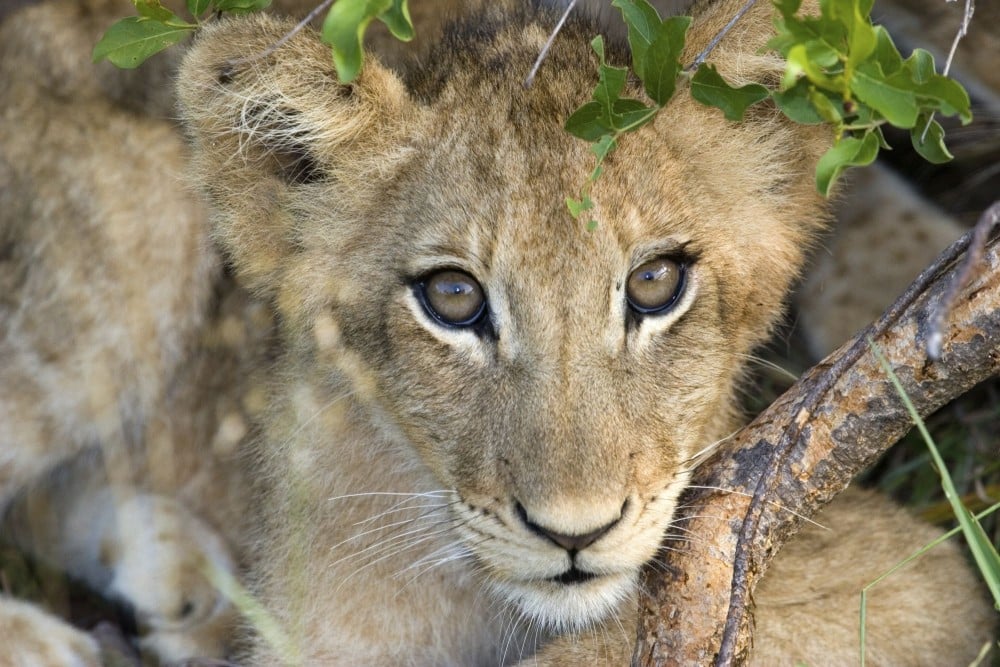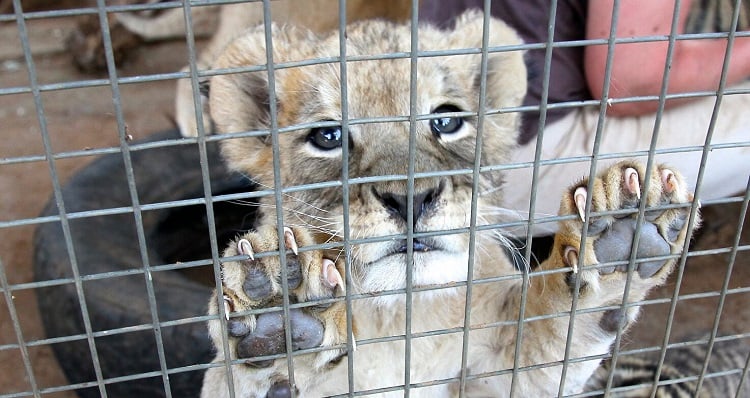
Lions and traditional medicine
Wildlife
What are the facts?
Why are lions farmed in South Africa for traditional medicine?
In South Africa, captive lions are bred for a range of commercial purposes including trophy hunting, tourism (e.g. cub petting, walk with lion experiences or volunteer with lion experiences) and for use in traditional medicine practises.
A large amount of lion bone is exported to Southeast Asia every year, where it is processed, ground up in to powders and used as an ingredient in traditional Chinese medicine remedies, particularly lion bone wine and bone ‘glue’[1].
Lion bone exports were initially thought to be a ‘by-product’ of the trophy hunting industry, but a study of skeleton exports in 2017 found that 91% included the skulls and were therefore likely killed specifically to supply the Southeast Asian bone trade[2]. Another recent study found that about one-third of the facilities breed and keep lions for the trade of bones and other lion products[3].
- 1. Outhwaite W. The Legal and Illegal Trade in African Lions [Internet]. TRAFFIC; 2018 Jun. Available from: https://cites.org/sites/default/files/eng/com/ac/30/Inf/E-AC30-Inf-15x…
- 2. EMS Foundation. The Extinction Business: South Africa’s ‘Lion’ Bone Trade. EMA Foundation and Ban Animal Trading; 2018 Jul.
- 3. Williams VL, Michael J. Born captive: A survey of the lion breeding, keeping and hunting industries in South Africa. PloS one. 2019;14(5).
How many lions are involved in the industry?
The exact number of lions varies between different sources but there are thought to be between 7,800 and 8,500 individuals bred at 300 to 400 facilities[4][5].
In 2019, the South African Minister of Environment, Forestry and Fisheries stated that the captive lion population in South Africa amounted to 7,979 lions housed across 366 facilities. The national quota for the number of lion bones South Africa can legally export per year is 800 skeletons.
The full scale of the illegal trade is unknown, but seizures have been linked to illegal transport of lion parts from South Africa to Southeast Asia, and within Asia between Vietnam, Lao PDR, China and Thailand by organised crime syndicates[6]. Over the past ten years, South Africa legally exported more than 10,000 lions (dead or alive) for commercial purposes, with the vast majority from the captive population (CITES database).
- 4. Coals P, Burnham D, Loveridge A, Macdonald DW, Sas-Rolfes M ’t, Williams VL, et al. The Ethics of Human–Animal Relationships and Public Discourse: A Case Study of Lions Bred for Their Bones. Animals. 2019 Feb;9(2):52.
- 5. Hutchinson A, Roberts DL. Differentiating captive and wild African lion (Panthera leo) populations in South Africa, using stable carbon and nitrogen isotope analysis. Biodiversity and Conservation. 2020;1–19.
- 6. Ratcliffe R. Vietnam bans imports of wild animals to reduce risk of future pandemics. The Guardian [Internet]. 2020 Jul 24; Available from: https://www.theguardian.com/world/2020/jul/24/vietnam-bans-imports-of-w…
How do the lions suffer on the farms?
Lions are forced to endure a lifetime of suffering on breeding farms. Breeding closely related animals can lead to genetic defects, causing cubs to be born with severe health problems such as missing limbs.
The cubs are taken from their mother very early so that tourists can take part in ‘cub-petting’ experiences and so that the mother will be able to produce more cubs and keep the industry going.
Why do people use lion bone for traditional medicine and what are the alternatives?
Lion bones have not been historically used in traditional medicine practises in Asia and have never been listed in the official listing of drugs and remedies used in Traditional Chinese Medicine (TCM). The export of lion bones from South Africa to Southeast Asia is thought to have started in around 2007.
It is possible to substitute animal-based traditional medicine remedies for herbal and plant based drugs. The majority of drugs and remedies used in TCM do not contain animal products and are instead based on plant, herb and mineral sources.
Is this farming lions and export of their bones legal?
In South Africa there are a number of complex laws and regulations governing lion farms at provincial, national and international level. Overall, the majority of the industry in, and originating from, South Africa is legal.
Internationally, the trade of lion bones from South Africa is legal, as long as the bones come from captive (farmed) lions and do not exceed an annual quota. The current annual quota for lion bone exports is 800 skeletons per year. Bone exports require permits, but permits are granted at the provincial level and there is no national database, therefore there is no way of knowing how many permits are granted overall each year.
There are media reports and scientific studies showing that the actual number of lion bones exported each year from South Africa exceeds the national quota, meaning these bones are traded illegally.
In July 2020 a new directive on wildlife management was issued in Vietnam by the prime minister, Nguyen Xuan Phuc, which implemented a (presumed temporary) ban on imports of wild animals, dead or alive, and announced a crackdown on illegal wildlife markets as part of efforts to reduce the risk of future pandemics such as Covid-19.
Although, at the time of writing, there are a few exceptions to this Directive, this means that the legal trade of lion bone is temporarily banned until further instruction from the Vietnamese Prime Minister.
What is World Animal Protection doing about this?
We are collaborating with Blood Lions, a South African based campaign organisation committed to ending the exploitation of lions in South Africa.
Together, World Animal Protection and Blood Lions have conducted research into the welfare challenges faced by lions in the lion farming industry, and the risk that lion farming poses to public health from zoonotic disease transmission. We submitted three evidence documents to the high level panel set up in 2019 to review the policies, legislation and management regarding breeding, hunting trade and handling of wildlife species, including lions, in South Africa.
We are raising awareness of the damage caused by the farming of big cats, including lions, by publishing educational information about how big cats are exploited for tourism and for canned hunting.
We are engaging with traditional medicine doctors, associations, relevant companies and consumers to practice and support wildlife-friendly traditional medicines. We have also been advocating for plant-based alternatives to wildlife use in traditional medicines.
What can I do to help the situation?
To help stop this cruel exploitation of lions, supporters can:
- Stop participating in interactive lion tourism experiences and visiting captive lion facilities in South Africa
- Not purchase or consume traditional medicine products containing lion bones or any other wild animal ingredients
- Sign up for our emails to receive updates on our latest campaigns and active petitions to make a lasting impact for animals everywhere

Will you help? Sign up for emails to hear how you can help protect wild animals from abuse and exploitation.
Get involved
Make a difference for animals